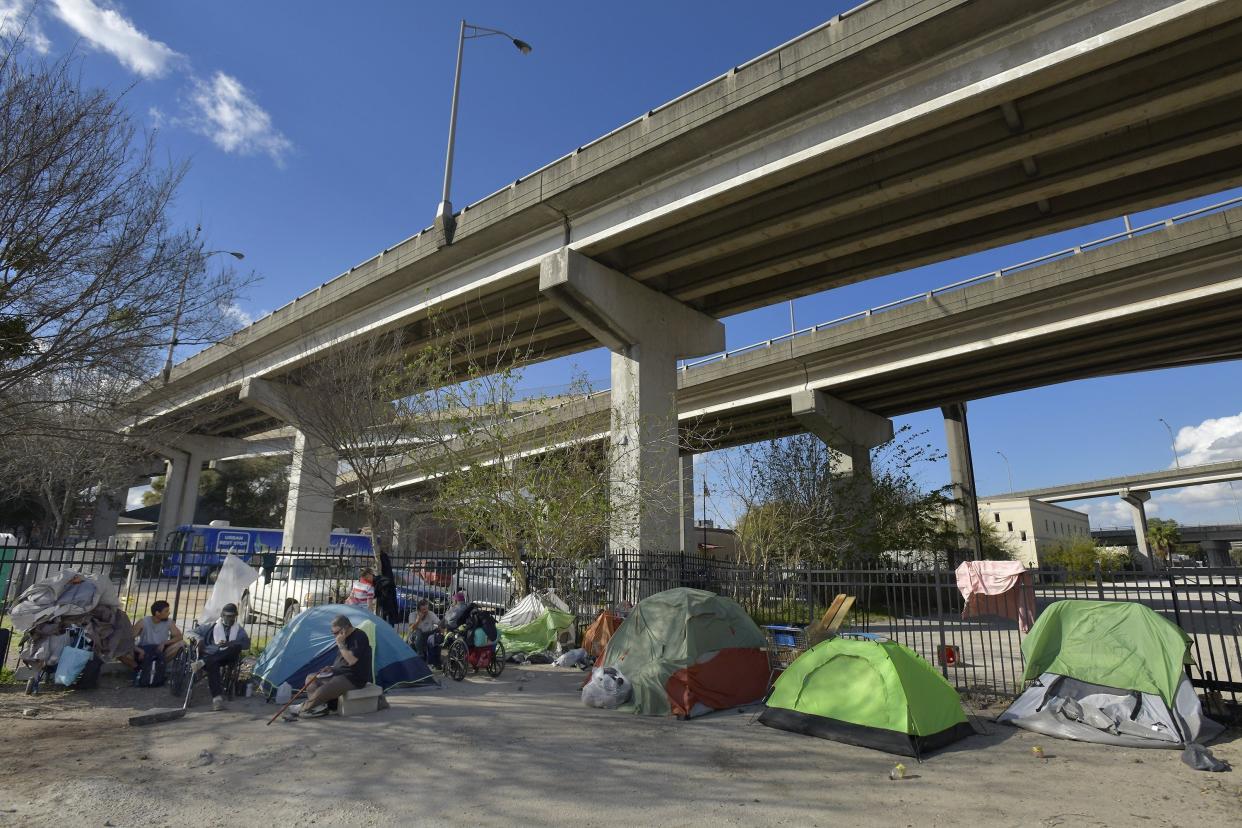Volunteers needed for 'critical' 2023 homeless count in Duval, Clay and Nassau counties

Changing Homelessness, the lead homeless prevention agency for Clay, Duval and Nassau counties, is seeking volunteers for an annual federally mandated survey of unsheltered people in the three counties.
With the past two years of survey results limited by the COVID-19 pandemic, the 2023 Point in Time count will be "especially critical," according to Dawn Gilman, CEO of the nonprofit.
"We have started to see some shifts in our system," she said, and a full count "is the best way for us to see how widespread it is. The changes we are watching closely are a rapid increase of people 55-plus living on the streets and families with young children."
Mandatory volunteer training sessions will be available Jan. 9 to 14.
Nonprofit will 'ouble down on our work':Jacksonville's Changing Homelessness gets $2.5M Bezos grant to 'double down on our work'
Point in Time:2022 Jacksonville-area homeless counts limited to 'minimize spread' of COVID-19
Every January, Changing Homelessness takes part in the nationwide census and survey of the homeless population. Typically, staff and 150 to 200 volunteers visit areas in Duval, Clay and Nassau where homeless people congregate, such as "places not designed for habitation including vehicles, streets, parks and abandoned buildings," according to the nonprofit. They also count people living in emergency shelters or transitional housing.
The results of the survey are used by multiple federal agencies to determine community funding levels to address homelessness. Advocates estimate Jacksonville has about 3,400 homeless people, but only 1,100 or so emergency shelter beds.
The annual numbers are also combined with 10-year trends and information from about 40 regional social service agencies that offer overnight emergency beds, transitional housing and supportive services. The resulting data reveals how the numbers of homeless change over time, according to Changing Homelessness.
"The PIT Count is an essential element in our effort to end homelessness, as the data gathered from this census shows us so much more than how many people are homeless — we also learn more about who is homeless and why," according to the nonprofit. "The PIT presents a great opportunity to raise awareness of the myriad challenges our neighbors experiencing homelessness face through personal experiences and demonstrate the compassion and generosity of our community."

The U.S. Department of Housing and Urban Development requires an unsheltered count be done at least every other year. A sheltered count — of people who had no permanent home but were living in emergency or transitional housing — must be conducted annually.
The 2020 Point in Time homeless count was conducted Jan. 22, the day after the first case of coronavirus was reported in the United States.
The count tallied 1,452 people experiencing homelessness in Duval, Clay and Nassau counties, a 52% decrease over the past decade. Whether the subsequent pandemic, which led to many job losses and evictions, would drive the numbers up was uncertain.
2021 Point in Time:2021 Point in Time: Pandemic may have caused under-reporting in Jacksonville-area homeless count
Homeless survey 2020:Overall Jacksonville-area homelessness still decreasing, but COVID-19 impact unknown
The 2021 count initially showed the opposite may have occurred. The number of unsheltered people that year appeared to be almost 50% less than 2020. But Gilman said at the time that the impact of the pandemic on homeless populations and their movements — and on collecting data about them — left conclusions in doubt. Also, a "quirk" in a new app the agency used to collect data, replacing paper, produced "invalid data" to gauge the chronically homelessness, she said.
Last year Changing Homelessness decided against mobilizing volunteers to conduct a full 2022 count because of the then-prevalent omicron variant. Instead, the count focused on people living in emergency or transitional housing. The tally was 1,049 people, including 292 families, 70 veterans and 88 people designated as chronically homeless, according to the Florida Council on Homelessness annual report.
The nonprofit used only staff from area homeless prevention agencies — none of the usual community volunteers — and extended the count from one day to three. Staffers also conducted socially distanced surveys at known locations of homeless people in downtown Jacksonville, as well as the Sulzbacher center's Urban Rest Stop and Mission House in Jacksonville Beach.
Earlier this year, Changing Homelessness received a $2.5 million grant to help the cause. The largest in the agency's nearly 50-year history, the grant came from Amazon founder Jeff Bezos' Day 1 Families Fund. The nonprofit will use the money to "leverage and improve existing family programs and fill in identified gaps," Gilman said at the time.
bcravey@jacksonville.com, (904) 359-4109
NORTHEAST FLORIDA POINT-IN-TIME COUNT
The count will be Jan. 25 in Duval, Clay and Nassau counties. In advance, volunteers must complete a 1½-hour training to learn basic information about the count, how to engage vulnerable populations and how to complete surveys via a mobile app. Training sessions are available in person or via Zoom Monday, Jan. 9, through Sunday, Jan. 14. Prior to the count, volunteers will select a location and time for their estimated four-hour shift within one of nine area zones. To register or get more information about the count, go to nefl.pointintime.info.
For more information about Changing Homelessness, contact the nonprofit at 660 Park St., Jacksonville; (844) 367-7783 or info@changinghomelessness or go to changinghomelessness.org.
This article originally appeared on Florida Times-Union: Jacksonville Changing Homelessness to prepares for Point in Time count

